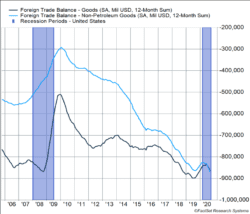U.S. stocks rallied on expectations that a stimulus package will be passed in the coming months and additional packages will be easier to pass. The Trump administration offered proposals closer to the most recent Democratic offer. Even if no deal is reached prior to the election, polls suggest the Democratic Party may control the presidency and both houses of Congress. One-party control makes it significantly easier to pass legislation.
Key Points for the Week
- U.S. stocks rallied on expectations of increased stimulus for the economy.
- Foreign trade data showed a large deficit as the U.S. imported more goods.
- Earnings are expected to drop 20.5% for companies in the S&P 500.
The U.S. trade deficit reached its highest level in 14 years. The demand for goods has increased and some of those goods are coming from overseas. Other global economies are recovering more slowly. Imports grew by 3.2% while exports grew only 2.3%. Services exports remain sluggish as tourism and services are pressured by risks associated with COVID-19. The already large trade deficit has continued to grow even though domestic energy production has eliminated the deficit associated with energy imports. (See Figure 1.)
The S&P 500 gained 3.9% last week. The MSCI ACWI index gained 3.7%. The Bloomberg BarCap U.S. Aggregate Bond Index dipped 0.2%.
Many corporations will report earnings in coming weeks. Analysts expect earnings from companies in the S&P 500 will decline 20.5% in the third quarter. Retail sales and industrial production will give investors further indication on how consumers are reacting to economic uncertainty.
Figure 1
A Pair of Paradoxes
Markets often seem full of contradictions, and last week was no exception. This week we’ll examine two paradoxes that contributed to a change in sentiment for stock investors.
The first paradox is markets rallied because the candidate who favors raising corporate taxes looked more likely to win. Former Vice President Joe Biden is gaining in the polls as the election nears. Rather than dropping on concerns of a less favorable business climate, stocks jumped higher.
It seems what investors want most are additional stimulus packages out of Washington to aid the recovery from COVID-19. They also may be discounting the odds of a corporate income tax hike. Stimulus packages inject the economy with additional demand. The government borrows money and sends it back into the economy in the form of spending or reduced taxes. During periods of economic slowness, the government can support demand when many individuals may be dialing back spending to conserve cash for a potential job loss or salary decline. Dialing back spending to conserve cash seems like a prudent idea, and budgeting experts roundly support it. The problems come when everyone does it at once.
The second paradox is often called the “paradox of thrift.” It posits if everyone cuts spending at the same time, the chance of a downturn increases because the reduced spending causes people to lose their jobs even though an economic decline hasn’t hit. One person’s spending is another person’s income.
Similar to pedaling a bike in high gear, economies are believed to do best when they maintain momentum. Like a bike, if the speed drops below a certain pace getting it back to speed can take a lot of effort.
The high number of new COVID-19 cases coupled with the continued low demand for key industries has slowed economic growth in recent months. Initially, there was a quick rebound in key industries as pent-up demand caused a surge of new sales. Because of both risk and regulation, the coronavirus continues to pressure economic activity and the quick rebound has slowed. Instead of being rehired, workers are being informed the job they planned to go back to no longer exists.
Political disagreements have slowed the approval of another stimulus bill. Forging compromise is more difficult this close to the election. The impediments to passing a bill fade significantly if one party controls the presidency and both houses of Congress. Sometimes investors like divided government because it is harder to make significant changes, and sometimes they want a unified government able to make big decisions.
The worst scenario for passing a stimulus bill is an election where the results are too close to call. Political tensions would likely be much higher and compromise difficult. The swing in the polls toward Biden and the increased odds of a Democratic Senate reduce the odds of a very close election and move the odds of a stimulus bill higher. There also remains the possibility a bill will be approved prior to the election.
This week’s rally showed some investors are willing to cast away previously held views on what is good for the market in order to clear the way for additional dollars designed to keep the economy in recovery mode.
—
This newsletter was written and produced by CWM, LLC. Content in this material is for general information only and not intended to provide specific advice or recommendations for any individual. All performance referenced is historical and is no guarantee of future results. All indices are unmanaged and may not be invested into directly. The views stated in this letter are not necessarily the opinion of any other named entity and should not be construed directly or indirectly as an offer to buy or sell any securities mentioned herein. Due to volatility within the markets mentioned, opinions are subject to change without notice. Information is based on sources believed to be reliable; however, their accuracy or completeness cannot be guaranteed. Past performance does not guarantee future results.
S&P 500 INDEX
The Standard & Poor’s 500 Index is a capitalization-weighted index of 500 stocks designed to measure performance of the broad domestic economy through changes in the aggregate market value of 500 stocks representing all major industries.
MSCI ACWI INDEX
The MSCI ACWI captures large- and mid-cap representation across 23 developed markets (DM) and 23 emerging markets (EM) countries*. With 2,480 constituents, the index covers approximately 85% of the global investable equity opportunity set.
Bloomberg U.S. Aggregate Bond Index
The Bloomberg U.S. Aggregate Bond Index is an index of the U.S. investment-grade fixed-rate bond market, including both government and corporate bonds
https://www.bea.gov/news/2020/us-international-trade-goods-and-services-august-2020
Compliance Case: 00874805



